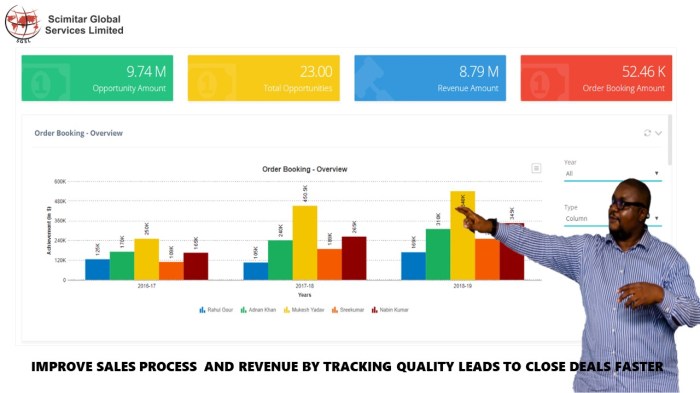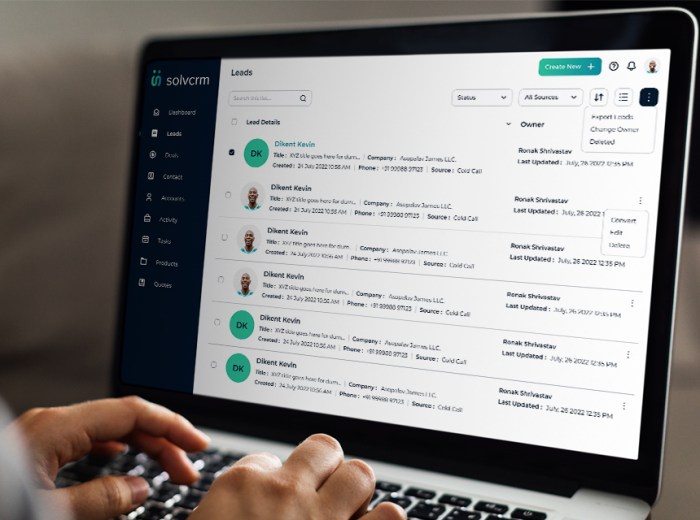Crm with accounting software – In today’s competitive business landscape, efficient management of customer relationships and financial data is paramount. Integrating Customer Relationship Management (CRM) software with accounting software offers a powerful synergy, streamlining operations and providing valuable insights for informed decision-making. This comprehensive guide explores the benefits, functionalities, and considerations of integrating these two crucial business tools.
Understanding the Synergy: CRM and Accounting Software Integration
Traditionally, CRM and accounting systems operated in silos, leading to data duplication, manual reconciliation, and inefficient workflows. Integrating these systems eliminates these bottlenecks by creating a seamless flow of information. This integration allows for automated data transfer between the two systems, reducing manual data entry, minimizing errors, and saving valuable time and resources. The result is a more accurate, efficient, and insightful view of your business’s financial health and customer interactions.
Key Benefits of CRM and Accounting Software Integration
- Improved Data Accuracy: Automated data transfer reduces manual data entry, minimizing human error and ensuring consistent, reliable data.
- Streamlined Workflows: Automated processes eliminate redundant tasks, freeing up staff to focus on higher-value activities like customer engagement and strategic planning.
- Enhanced Reporting and Analytics: Combined data provides a holistic view of your business, enabling more comprehensive and accurate reporting on key performance indicators (KPIs).
- Better Customer Insights: Linking customer interactions with financial data reveals valuable patterns and insights into customer behavior, profitability, and lifetime value.
- Improved Sales Forecasting: Accurate sales data integrated with financial information allows for more precise sales forecasting and resource allocation.
- Simplified Financial Management: Automated invoice generation, payment tracking, and expense management streamline financial processes.
- Reduced Operational Costs: Automation and improved efficiency lead to significant cost savings in the long run.
- Better Collaboration: Integrated systems facilitate seamless communication and collaboration between sales, marketing, and finance teams.
Features and Functionalities of Integrated CRM and Accounting Systems
The specific features and functionalities of integrated CRM and accounting software vary depending on the chosen platforms. However, some common features include:
Core Integrations:
- Automated Invoice Generation: CRM data, such as customer details and services rendered, automatically populates invoices in the accounting system.
- Real-time Payment Tracking: Payment information from the accounting system is reflected in the CRM, providing up-to-date visibility into customer accounts.
- Automated Expense Tracking: Expenses related to specific customer projects or campaigns can be automatically tracked and allocated.
- Customer Profitability Analysis: Integrated data allows for detailed analysis of customer profitability, identifying high-value and low-value clients.
- Sales Pipeline Management: Track sales progress and forecast revenue based on the pipeline and customer interactions within the CRM.
- Inventory Management (for applicable businesses): Integration with inventory management features allows for real-time tracking of stock levels and accurate cost of goods sold calculations.
Choosing the Right CRM and Accounting Software Integration
Selecting the right integrated solution requires careful consideration of several factors:
Factors to Consider:, Crm with accounting software
- Business Size and Needs: Choose a solution that scales with your business growth and meets your specific requirements.
- Budget: Consider the cost of the software, implementation, and ongoing maintenance.
- Integration Capabilities: Ensure seamless integration between the chosen CRM and accounting software.
- User-Friendliness: Opt for a system that is intuitive and easy to use for all team members.
- Scalability: The system should be able to handle increasing data volume and user numbers as your business grows.
- Customization Options: Choose a solution that can be customized to fit your specific business processes.
- Security and Data Protection: Prioritize systems with robust security features to protect sensitive customer and financial data.
- Support and Training: Reliable customer support and training resources are crucial for successful implementation and ongoing use.
Popular CRM and Accounting Software Integrations
Many CRM and accounting software providers offer native integrations or partnerships to facilitate seamless data exchange. Some popular examples include integrations between:
- Salesforce and Xero
- HubSpot and QuickBooks Online
- Zoho CRM and Zoho Books
- Microsoft Dynamics 365 and Sage Intacct
It’s important to research and compare different options to find the best fit for your business needs and budget. Many providers offer free trials or demos, allowing you to test the software before committing to a purchase.
Frequently Asked Questions (FAQ): Crm With Accounting Software
- Q: What are the benefits of integrating CRM and accounting software?
A: Integration offers improved data accuracy, streamlined workflows, enhanced reporting, better customer insights, and reduced operational costs. - Q: How does CRM and accounting software integration improve customer relationships?
A: By providing a complete view of customer interactions and financial data, businesses can better understand customer behavior, personalize interactions, and improve customer service. - Q: What are the potential challenges of integrating CRM and accounting software?
A: Challenges can include data migration issues, system compatibility problems, and the need for adequate training for staff. - Q: How much does it cost to integrate CRM and accounting software?
A: The cost varies significantly depending on the chosen software, implementation complexity, and ongoing maintenance requirements. - Q: What are some examples of popular CRM and accounting software integrations?
A: Popular integrations include Salesforce and Xero, HubSpot and QuickBooks Online, and Zoho CRM and Zoho Books. - Q: How do I choose the right integrated solution for my business?
A: Consider your business size, budget, integration capabilities, user-friendliness, scalability, customization options, security, and support.
Conclusion
Integrating CRM and accounting software offers a powerful solution for businesses seeking to improve efficiency, gain valuable insights, and drive growth. By streamlining workflows, enhancing data accuracy, and providing a holistic view of customer interactions and financial performance, integrated systems empower businesses to make informed decisions and achieve their strategic goals. Careful consideration of your business needs and a thorough evaluation of available solutions are key to successful implementation and maximizing the benefits of this powerful integration.
References
Call to Action
Ready to unlock the power of integrated CRM and accounting software? Contact us today for a free consultation and let us help you find the perfect solution for your business needs!
FAQ Overview
What are the benefits of integrating CRM and accounting software?
Benefits include improved data accuracy, automated reporting, reduced manual data entry, better customer insights, and enhanced financial forecasting.

Source: scimitargsl.com
What types of businesses benefit most from this integration?
Businesses of all sizes can benefit, but those with complex sales processes, multiple revenue streams, or a high volume of transactions often see the greatest returns.
How much does CRM with accounting software integration typically cost?
Costs vary widely depending on the chosen software, features, and implementation needs. It’s best to contact vendors for specific pricing.

Source: solvcrm.co
What are some common challenges associated with integration?
Challenges can include data migration issues, system compatibility problems, and the need for employee training.
Is it possible to integrate existing CRM and accounting systems?
Yes, many systems offer integration capabilities, though the complexity depends on the specific software used. Professional assistance may be needed.
